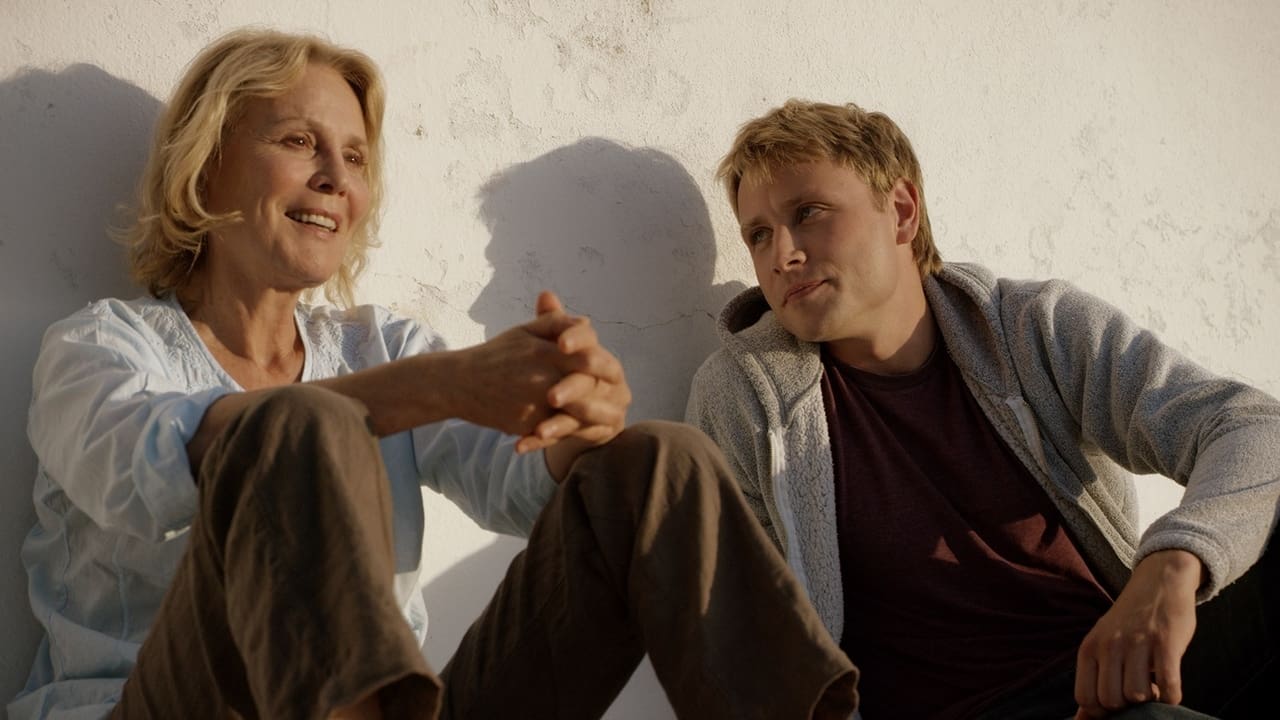RyothChatty
ridiculous rating
KnotStronger
This is a must-see and one of the best documentaries - and films - of this year.
Bluebell Alcock
Ok... Let's be honest. It cannot be the best movie but is quite enjoyable. The movie has the potential to develop a great plot for future movies
Sameer Callahan
It really made me laugh, but for some moments I was tearing up because I could relate so much.
Paul Allaer
"Amnesia" (2015 release from France/Switzerland; 96 min.) brings the story of Martha, a woman in her 60s or so, and Jo, a guy in his 20s. As the movie opens, we see Martha enjoying the sunset somewhere on an island. We then go to "10 years earlier - Spring, 1990", shortly after the fall of the Berlin wall. Martha is speaking English to her German brother who is trying to convince her to sell something back in Germany. Later, Martha's new neighbor Jo stops by as he cuts his hand accidentally. Jo is a DJ from Berlin hoping to make it big on Ibiza. Martha doesn't disclose to him that she is German, and they converse in English. Martha also refuses to ride in his car (a VW). Along the way, Martha and Jo become good friends. At this point we're not even 15 min. into the movie but to tell you more of the plot would spoil your viewing experience, you';; just have to see for yourself how it all plays out.Couple of comments: this is the latest movie from director Barbet Schroeder (Single White Female; Reversal of Fortune)> Here he tackles a very different topic, namely the long shadows of WW II onto ordinary Germans. The movie is paced very slowly, and it takes quite a while to find the movie's definitive direction, but once we get there, there is no escaping it. The acting by both leads (Marthe Keller as Martha, and Max Riemelt as Jo) really carry the movie. The movie's photography is pure eye-candy, and in a way the film can be viewed as a 90 min. commercial for Ibiza. And let's not forget Schroeder. He has been making films since 1969 (when he directed "More", yes, the film for which Pink Floyd did the soundtrack). The guy is now in his 70s and he is still going very strong. And why not!"Amnesia" premiered at the 2015 Cannes Film Festival. I don't think that it ever got a US theatrical release, but thank goodness for the folks at Film Movement, which eventually released it as part of its Movie of the Month Club releases. That is how I eventually got to see it. If you are in the mood for a foreign talk (no action!) about the long shadows of WW II, I encourage you to check this out.
philip-davies31
The sublime Marthe Keller - as Martha - quietly invokes the conscience of Germany with a therapeutic balm, even as she draws the old agony from the lost youth of War. She applies aloe vera, stinging but healing her new young neighbour Jo's gashed hand. The national wound is drawn together at last, as a beautiful relationship mends the two sides of history with a platonic Spring and Autumn romance, even as East and West Germany are falling into each other's arms through the Berlin Wall. Bruno Ganz gets to show us and Jo how his character is still possessed by Hitler's ghost, and how, as that demon is exorcised from Jo's dear grandad, all childhood illusions vanish. The old man's daughter, Jo's mother, is the defiant survivor of the ruins her father's generation left for her generation, with their defeat. However, scarred emotionally, she has inwardly shuddered for years at hearing her father obsessively tell over and over the one anecdote of the war whose unstable narrative has endlessly turned and twisted in the telling, as if to shake off the living nightmare of the truth. The holiday visit to their son turns chilly when, in the presence of Martha's implacable revulsion from all things German, the post-war period of structural and economic restoration suddenly looks like a time of shattered spirits. This collapse is written in the daughter's brittle expression, and in the inconsolable despair of her father. Jo's family leave for Germany, but, recoiling from the Hellish glimpse into the abyss of Hitler's Germany he for the first time sees in their souls, he remains on Martha's enchanted island of Ibiza, eventually putting these lingering horrors of Germany behind him as he builds a successful music career at the famous Ibizan dance club, 'Amnesia', and starts a family with a young girlfriend. It is hinted that the young couple do eventually go to live in Germany, where probably their new baby has been born, and that at some time Martha also returns, though briefly, possibly to sell her late father's house, to be able at last to buy her home in Ibiza and avoid her impending eviction. Martha then grows old as their friend, reconciled at last to all the best of Germany, the love of which had been destroyed during the experiences of her own youth. The final scene seems to suggest that the young family later returned to Martha's old house. Martha by this time may have become just the friendly spirit of the place, with the passage of time, as is perhaps evoked by a strange shot of her translucent image walking across the patio, with the aid of a stick, before the young family gathers round the presence - possibly imaginatively and lovingly recalled - of Martha's spirit, now at peace.Recovery from amnesia was effected by facing the cleansing pain in the soul. Only what is recalled can be truly forgiven, since forgetting - as Martha finally learns - is the antithesis of forgiveness. In old age, she is reunited with her true identity, redeemed by pity for the tortured survivors of her own country's catastrophe. At last, perhaps all the German exiles were able to go home.A tender, evocative and subtly rendered drama of troubled spirits being put to rest. Most critics trampled all over this delicately delineated life as intrusively and uncomprehendingly as the couples who came to view Martha's home, when it was about to be sold from under her by a new landlord, and whose insensitive attempts, as prospective buyers, to invite themselves in to poke around, she rightly rebuffed as an unfeeling intrusion. But at least these interlopers did appreciate the charm of the location. Most professional critics however are like brash tourists, who rush around with a lot of noise, noticing nothing, and complaining loudly. They should never be allowed into the secrets of such a wonderful film as this. They only ruin everything with their inane yet self-important chatter!A visit to the enchanted island of this lovely, delicate and yet powerful drama is wasted on such typically pretentious boors. They invariably 'break a butterfly upon a wheel' in the course of their hostile inquisitions.
Moviegoer19
This film is a great example of what I think of as European sensibility: the characters, be they male or female, old or young, are not afraid or ashamed of being thoughtful, sensitive, and introspective. There is a gentleness that is often found in European films of this type, that is not in their American counterparts. There is a slowness as the camera lingers on scenes, such as the sea in the distance, or the sun setting, and on details, such as plants in the garden, or a candelabra lighting a room at night. The European sensibility, combined with the story being told here, of one woman's perspective of World War II remembering it from many years after it happened, create a poignant and beautiful story about living, growing older, and the relationship of people to each other and to the beauty offered by nature and the earth. I loved it.
Larry Silverstein
Set on the island of Ibiza, Spain, in 1990, this latest movie from the acclaimed Swiss director Barbet Schroeder is a quiet yet absorbing drama.The two leads here Marthe Keller and Max Riemelt are both excellent in their roles of Martha and Jo respectively. Martha is an expatriate from Germany who has rented a house in Ibiza for years, overlooking the beautiful Mediterranean Sea. The much younger Jo, a native Berliner, has just moved in as Martha's neighbor, with aspirations of creating and playing his own techno music in the thriving local clubs.Despite the difference in their ages, there is an immediate chemistry and comfort level between the two. Martha, however, having left Germany in 1936, during the time of Hitler and the Nazis, has been so revolted by the actions of her countrymen during the war that she has refused to speak the German language to this day, has not returned to her native country, or used any products manufactured by the Germans such as VW's.On the other hand, Jo only has learned of the war and the Nazis through school and from filtered stories from his mother and grandfather. Thus he has the attitude of not dwelling in the past but moving forward, not only individually but for his native Germany as well. When Jo's mother and grandfather arrive in Ibiza from Berlin for a visit, some truths about the Nazi horrors will emerge, leading to changes for all concerned.There are two concurrent themes being played out in the movie. The first being that of a possible May-December relationship between Martha and Jo. The second being how some Germans choose to have selective amnesia about what really occurred during WW2 and want to just move on and leave all that for the history books.All in all, I found this to be a well acted, quiet, and cerebral film that I found myself engaged in from start to finish. It also has some wondrous cinematography of the Mediterranean Sea and surrounding areas.

